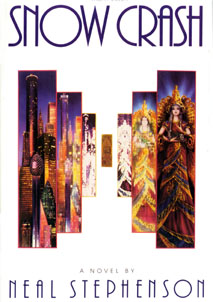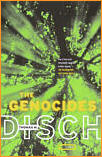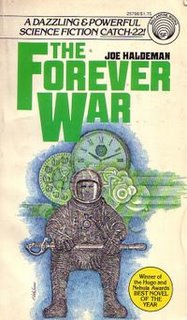What’s Missing? part i
I’m calling this “part i” because any debate about what David Pringle left off his list of the 100 Best Science Fiction Novels will necessarily go on forever. These are just my thoughts tonight, and what I’m about to suggest aren’t necessarily books that I think HAVE to be on a 100 list. Instead, I mean these as suggestions for consideration. In that respect, I have to admit up front that I haven’t read every page of every book that follows. But here’s something to chew on…

First things first, there are clearly several books that could be on a list like this if it had been compiled more recently. Looking that direction seems fairer to me than working backwards (which for fun’s sake would have to include Wells, Olaf Stapledon, and here I’m doing what I said I wouldn’t) because Pringle had a definite starting point in mind when he put his list together. Neal Stephenson (Snow Crash), China Mieville (The Scar), the always-out-of-print-in-the-US Iain M. Banks (The Player of Games?, Excession?), and Greg Bear (though I personally would not vote for Moving Mars) would be there somewhere, yes? Kim Stanley Robinson’s Mars trilogy or Three Californias series would have to be up for serious consideration. Perhaps Bruce Sterling and Rudy Rucker missed Pringle’s eye because of publication dates. Dan Simmons’ Hyperion and David Brin’s forget-the-Costner-film-already-and-read-the-book The Postman would have to be given serious thought because of their popularity. And speaking of popularity, it’s seems Douglas Adams’ The Hitchhiker’s Guide to the Galaxy would be included, and I personally think it would be a no brainer to have Ender’s Game on the list.
I think one major difference, if Pringle had written his book now, would be the number of female authors on the list. Octavia Butler is already there, but Kindred is not. And I think Parable of the Sower would be a good candidate, too. Cherryh (Downbelow Station or maybe Cyteen) and Willis (Doomsday Book) are serious candidates for the final cut, and I would be strongly in favor of seeing The Sparrow by Mary Doria Russell on the list.

My own personal qualms with Pringle, however, are often not with the writers missing but with what books he’s chosen by the ones that are there. For example, there are six Philip K. Dick novels on the list but no A Scanner Darkly. Thomas Disch is on three times, so I don’t really have reason to bitch, but I really do enjoy (I can see the hate mail now) The Genocides. I love Camp Concentration, 334, and all, but the simplicity and gruesome disaster thrills of TG win me over. Like Pringle, I’m not a huge fan of Asimov, and even if we were all to dismiss the Foundation Trilogy like he does, it seems like there are some better choices for Asimov’s sole representation on the list than The End of Eternity. If The Martian Chronicles and 334 count as novels, maybe I, Robot can as well. And if it doesn’t, perhaps The Gods Themselves might be a nice choice. Which Heinlein books to include can be debated ad nauseam, but I would like to have seen The Moon is a Harsh Mistress, Stranger in a Strange Land, or Starship Troopers get its due. As well, Rendezvous with Rama by Arthur C. Clarke is one of my favorite sf novels and created the whole big-ass-strange-thing-flying-in-space subgenre, though it’s nowhere to be found. Delany’s Dhalgren and/or The Einstein Intersection are missing, as is Slaughterhouse-Five, Ringworld by Larry Niven, Lord of Light and Damnation Alley by Zelazny, and Pohl’s Gateway.

Beyond all that, many miss van Vogt. But the one novel I really wished was there is Joe Haldeman’s The Forever War, which seems like a David Pringle kind of book to me. And if we threw in non-English titles, a whole new can of worms would be opened. Top of the list for me if that were true: Solaris by Stanislaw Lem. But, yak, yak, yak. Any of the five people I know read this have any thoughts? Or certainly any one else out there. If Pringle wrote the list as 1949-2006, what should be included? Any quibbles with the novels within his timeframe (1949-1985)? Do you think I have any idea what I’m talking about?




3 Comments:
Hi, Jason.
As one of the five, I feel I must weigh in, even though it looks like you've covered many of my own concerns with Pringle's selections -- especially in regard to "The Forever War." I loved that book when I was a teenager, but I haven't read it in years. Strangely, I ended up reading "Forever War" right after I'd read "Starship Troopers," which made for a very discordant jump in tone and sensibility. But you know, there's life for you.
As to the issue of Bruce Sterling, I'm a little surprised he's not in the list. In fact, I would bump Michael Moorcock's "Dancers at the End of Time" in favor of a Sterling (I've always had a soft spot for both "Involution Ocean" and "The Artificial Kid"). I love Michael Moorcock, but "Dancers" made absolutely no impression on me. I read it, it's on my shelf, but I have no recollection of it. Moorcock's Jerry Cornelius stuff is great though, always enjoyable and always rewarding. I kind of see Sterling's mutable protaganists as successors to Cornelius' free-wheeling identity, and I'd feel better about Pringle's list with Sterling on there at least once.
"Solaris" is the missing piece of my education. I've always meant to read it, or at least one of Lem's books, but I never have.
Which brings me to a question: What's your stance on the Signal Work of a particular author?
For example, I have all of William Burroughs' books -- but "Naked Lunch" is the last one I'll read. It's his most famous, most readily available book (hell, even Borders carries it, and they only have two Burroughs books in stock at any given time), and yet I've avoided it. I know that's part of my perverse nature, to avoid whatever is most widely accepted, and it's a trait I didn't develop until I was older.
When I was younger, I sought out the books by Heinlein and Asimov that were regarded as the author's respective "greatest" work. I soon found that I didn't like these books as much as the lesser-known books (in Asimov's case, I didn't really like any of them). So, now I approach an unfamiliar author who has a large output by picking a secondary book, or a lesser masterpiece as my point of entry. I like to approach the masterpiece later, after I already have a feel for the author and can see for myself the culmination of the author's style, ideas and execution.
Pringle's list seems to go for the Masterpiece more often than not; It's antithetical to my approach, but I can see why he chose most of these -- it's the "If you only read one book by BLANK, make sure you've read MASTERPIECE" approach. But your quibbles with his list seem to imply that you also like to avoid the "acknowledged masterpiece" in favor of the better story. Do you also choose to hit the masterpiece later?
And if so, what am I to do about Lem's "Solaris?" Should I read it as my first Lem, or should I pick up "Cyberiad" like I planned?
Ah, choices, choices.
Paul
Hot damn! Thanks for writing, Paul.
I think Pringle is a strange fellow, but I’m glad he’s out there. A lot of great British sf from writers like J.G. Ballard wouldn’t have made its way into the world, or across the pond for that matter, without him. But he has a strange approach with this list. He does often go for the masterpiece, though sometimes the more interesting, less known title. But then he also falls for peer pressure (Pringle: “Some are other people’s favourites, novels which have been outstandingly popular or influential, or which seem to be especially good representatives of their type.”) and picks things he doesn’t even like. He even states in the introduction that “A small minority, perhaps as many as ten, are books for which I have little or no personal enthusiasm: they have been included for the sake of balance and variety” and that more than seventy of his selections “are decidedly less than masterpieces” (i.e., they have no literary value). Asimov is a good example. So he doesn’t go for the fan-favorite “Foundation” but takes the lesser read “The End of Eternity” instead, while clearly making the point that he thinks Asimov is overrated and that he doesn’t like his writing. “The End of Eternity” is basically the only thing by him that Pringle could tolerate. So why pick any Asimov? Like you, he doesn’t thrill me, so I for one wouldn’t have been offended. Let the Foundation trilogy top reader polls and be done with it.
As for Sterling, Pringle has said that his choice for #101 would have been Sterling’s “Schismatrix” if the space had been allowed. A poor consolation prize. Perhaps he should have dumped Asimov (boy, it is really hard to say that a writer like Asimov shouldn’t be on a list like this, isn’t it?) for Sterling.
As for me, I’m schizophrenic. Sometimes I just read what sounds interesting to me at the time, which has led to an eclectic but unfocused reading history and the reason why I’m doing this Pringle project in the first place. Other times I read something because I think I should or somebody else told me to. Especially with sf, I have a stupid idea that I need to read everything, whether I want to or not. Oddly, that’s only led me to think I’ve read next to nothing. Anyway, I know what you’re saying about masterpieces, and I certainly find myself suspicious of them. I avoided Arthur C. Clarke completely for years because of his reputation as one of the fathers of the genre (what could be more boring?). Then I actually read one his novels…and then another and another. As for Lem, I think “Solaris” is just a damn good novel (neither film adaptation comes close to capturing its intricacies by the way), but I haven’t read anything by him that isn’t intriguing. I don’t think there’s a wrong place to start.
I think you had to know I'd get back this way eventually. Some weeks it just takes me a little longer to catch up.
The whole "Let's Make A List" thing is such a subjective exercise; to everyone other than the list maker, certain choices are going to appear arbitrary or ill-informed. But that's also what makes these lists interesting. It's nice to see the thoughts of another crystalized in such an orderly fashion. I don't think it matters whose list of SF we discussed -- we'd still quibble. But that's the point, isn't it? To get people talking about these books, especially the ones that are a little more obscure or forgotten. Overall, I think Pringle's done an admirable job, especially since his criterion is not "Best Sci-Fi" but "Most Important Sci-Fi." That's a daunting task.
On Masterpieces: It's strange that you'd mention Mr. Clarke, because I've studiously avoided him since I tried to read "Rendezvous with Rama" at the age of 10 or 11. I didn't like it, but in my defense, I believe I was reading a lot Edgar Rice Burroughs at the same time, and Clarke was probably too cerebreal by half to compete with the marvels of Barsoom. I should probably get around to Clarke soon, the same with Lem.
But that's another problem: I hate the "should really read this" phenomenon. I don't want to be obligated to read something. Which is why I could never undertake the project you've set for yourself. I wouldn't make it past the third book on the list, because I can't be that regimented in my reading. I have a pile of books on my desk (mostly purchased from the lovely Subterranean Books in beautiful uptown University City -- free plug), and I like to read whichever one the cats knock on the floor. This cat-gravity system of selection has worked quite well for the past year or two, and I see no reason to change it. I'll start "Sir Gawain and the Green Knight" this evening because Phoenix nosed it to the floor last night.
But this has me thinking. Couldn't I make some sort of flow chart or web of books to read based on what my cats select for me? I should write down everything I've read by this system so far, and then determine if there's a pattern or theme. Maybe my cats have a plan for me.
Paul
Post a Comment
<< Home